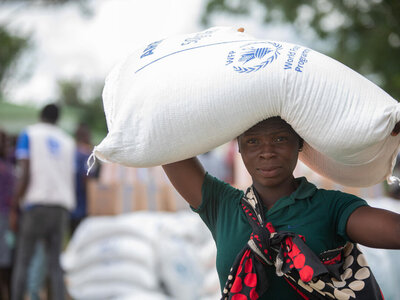Mozambique
- 2.7 million
- people are food insecure
- 37%
- of children under 5 are malnourished
- 34 million
- population
Mozambique is a low-income, food-deficit country that is predominately rural. Ranked 182 out of 193 countries in the 2025 Human Development Index, 82 percent of the population live in extreme poverty.
The faces overlapping challenges of conflict, poverty, malnutrition and climate shocks. HIV remains a leading cause of death.
Around 2.7 million people face food insecurity and need urgent support. Most Mozambicans cannot afford a nutritious diet, and malnutrition remains a leading cause of child mortality.
Approximately 72 percent of young children are malnourished and 37 percent of children under 5 are stunted, with their growth and development hindered by long-term malnutrition.
Mozambique is one of the world’s most disaster-prone countries, facing recurrent droughts, floods and cyclones that, combined with conflict and economic instability, continue to erode livelihoods and deepen food insecurity. The country faced severe flooding in early 2026, affecting nearly 700,000 people.
The World Food Programme (WFP) supports the Government of Mozambique in improving food and nutrition security and strengthening resilience to multiple crises. We link emergency response with early recovery and resilience-building efforts that address the root causes of vulnerability. However, funding shortfalls are forcing WFP to cut back on support.
What the World Food Programme is doing in Mozambique
-
Humanitarian response
-
Due to limited resources, WFP is providing food rations every other month to people affected by the conflict in northern Mozambique, through both food and cash-based assistance. In 2025, funding shortfalls forced WFP to further scale down its support from 1 million people in 2024 to 345,000. In addition, WFP assisted 118,000 people affected by cyclones and an additional 250,000 food-insecure people affected by the El Niño-induced drought in central and southern provinces during the 2024–2025 season.
-
Nutrition and HIV
-
Climate resilience
-
Disaster risk management and social protection
-
School meals
-
United Nations Humanitarian Air Service
Mozambique news releases
Go to pagePartners and donors
Find out more about the state of food security in Mozambique
Visit the food security analysis pageOperations in Mozambique
Contacts
Office
Rua 1109, perpendicular a Av. Paulo Samuel Kankhomba, Malhangalene A, KaMpfumo, Maputo
Maputo
Mozambique







